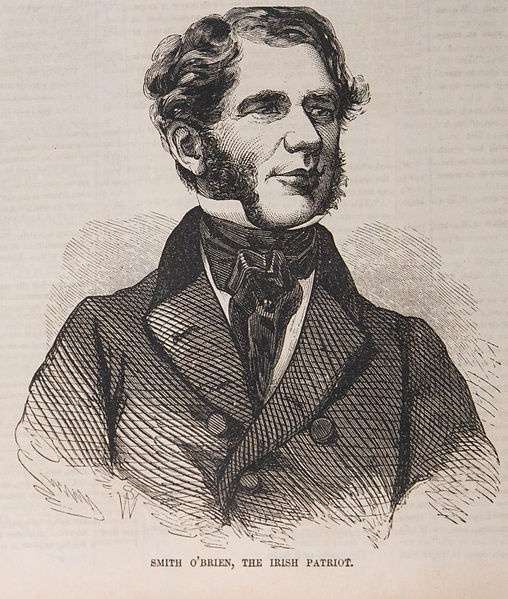
William Smith O'Brien (17 October 1803 – 18 June 1864) was an Irish Nationalist, Member of Parliament (MP), and leader of the Young Ireland movement, convicted of sedition for his part in the Young Irelander Rebellion of 1848, but his sentence of death was commuted to deportation to Van Diemen's Land. In 1854, he was released on the condition of exile from Ireland, and he lived in Brussels for two years. In 1856 O'Brien was pardoned and returned to Ireland, but he was never active again in politics.
Born in Dromoland, Newmarket on Fergus, County Clare, he was the second son of Sir Edward O'Brien, 4th Baronet, of Dromoland Castle. William took the additional surname Smith, his mother's maiden name, upon inheriting property through her. He inherited and lived at Cahermoyle House, a mile from Ardagh, County Limerick. He was a descendant of the eleventh century Ard Rí (High King of Ireland), Brian Boru. He received an upper-class English education at Harrow School and Trinity College, Cambridge.
Although a Protestant, he supported Catholic Emancipation while remaining a supporter of British-Irish union. In 1843, in protest against the imprisonment of Daniel O'Connell, he joined O'Connell's anti-union Repeal Association.
Three years later, disillusioned by O'Connell, O'Brien withdrew the Young Irelanders from the association. With Thomas Francis Meagher, in January 1847 he founded the Irish Confederation. In March 1848, he spoke out in favour of a National Guard and tried to incite a national rebellion.
Notably, O'Brien was a founding member of the Ossianic Society, whose aim was further the interests of the Irish language and to publish and translate literature relating to the Fianna.
He wrote to his son Edward from Van Diemen's Land, urging him to learn the Irish language. He himself studied the language and used an Irish-language Bible, and presented to the Royal Irish Academy Irish-language manuscripts he had collected. He enjoyed the respect of Clare poets (the county being largely Irish speaking at the time), and in 1863, on his advice, Irish was introduced into a number of schools there.

